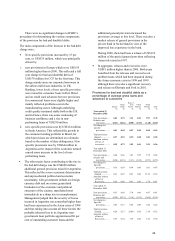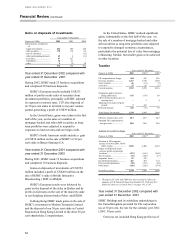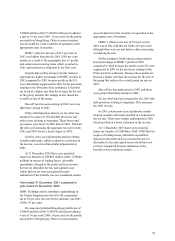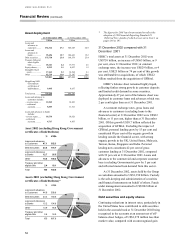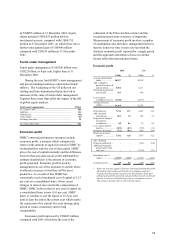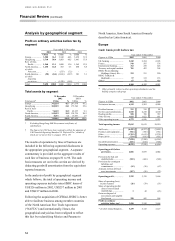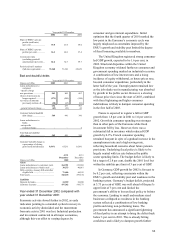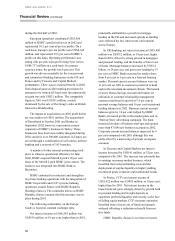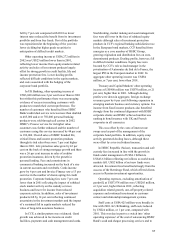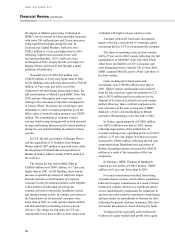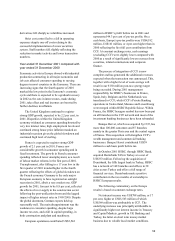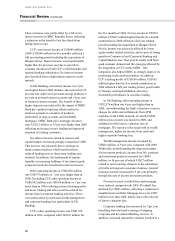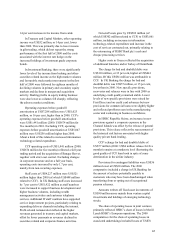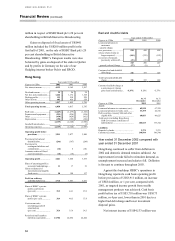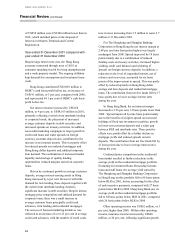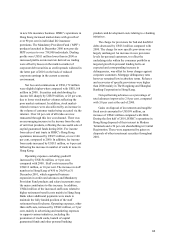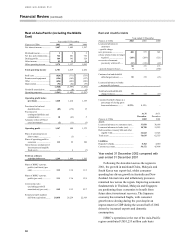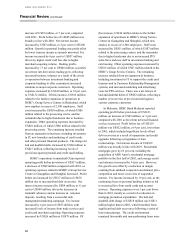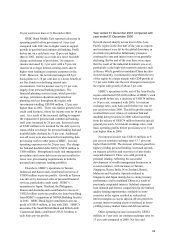HSBC 2002 Annual Report Download - page 61
Download and view the complete annual report
Please find page 61 of the 2002 HSBC annual report below. You can navigate through the pages in the report by either clicking on the pages listed below, or by using the keyword search tool below to find specific information within the annual report.59
derivatives fell sharply as volatilities increased.
Strict cost control led to a fall in operating
expenses despite one-off costs relating to the
successful implementation of a new securities
system. Staff numbers fell slightly reflecting the
reduction in market activity and lower transaction
numbers.
Year ended 31 December 2001 compared with
year ended 31 December 2000
Economic activity in Europe slowed with industrial
production contracting in all major economies and
job cuts affected consumer spending to varying
degrees in most countries in the Eurozone. There are
increasing signs that the fourth quarter of 2001
marked the low point in the Eurozone’s economic
cycle and there is expected to be a gradual recovery
in 2002 as the cuts in interest rates, made during
2001, take effect and real incomes are boosted by
further declines in inflation.
The United Kingdom continued to register
strong GDP growth, expected to be 2.2 per cent, in
2001. Disparities within the United Kingdom
economy widened as consumer spending boosted by
very low interest rates, high employment levels and
continued strong house price inflation masked an
industrial recession given the global slowdown and
continued high level of sterling.
France is expected to register strong GDP
growth of 2.1 per cent in 2001. France saw
considerable growth in consumer spending and in
fixed investment. The growth in French consumer
spending reflected lower unemployment, as a result
of labour market reforms in the first part of 2001.
Unemployment, after falling to a 17 year low in the
first quarter of 2001 trended higher in the fourth
quarter reflecting the effects of global slowdown on
the French economy. Germany is the only major
European economy to have registered an outright
recession in 2001, albeit a very modest one. GDP
growth for 2001, forecast to be 0.8 per cent, reflected
the effects of over supply in the construction sector
following the post-unification boom and the lagged
impact of higher interest rates in 1999/2000. Despite
the global downturn, German exports held up
reasonably well. The main disappointment was the
weakness in consumer spending, despite large
income tax cuts, and a fall in capital spending, in
both construction and plant and machinery.
European operations contributed US$3,542
million to HSBC’s profit before tax in 2001 and
represented 44.3 per cent of pre-tax profits. On a
cash basis, Europe’s pre-tax profits were US$4,182
million, US$161 million, or 4 per cent higher than in
2000 reflecting the first full year contribution from
CCF. At constant exchange rates, cash earnings
(excluding CCF) were slightly lower compared with
2000 as a result of significantly lower revenues from
securities, related commissions and corporate
finance.
The process of integration of CCF is now
complete and has generated the additional revenues
expected when the transaction was announced. This,
together with a higher level of costs savings will
result in our €150 million post-tax synergy target
being exceeded. During 2001 management
responsibility for HSBC’s businesses in France,
Spain, Italy, Belgium and the Netherlands was
transferred to CCF; whilst CCF’s Private Banking
operations in Switzerland, Monaco and Luxembourg
were merged within HSBC Republic Suisse. Within
France, the HSBC hexagon symbol has now been put
on all branches in the CCF network and most of the
investment banking businesses have been rebranded.
Banque Hervet, which was acquired by CCF, has
more than 100,000 customers and 87 branches
mainly in the greater Paris area and the central region
of France. This acquisition will strengthen CCF’s
wealth management and commercial banking
businesses. Banque Hervet contributed US$39
million to cash basis profit before tax.
In October 2001 HSBC, through HSBC Bank,
acquired Demirbank TAS in Turkey at a cost of
US$353 million. Following the acquisition of
Demirbank, the fifth largest bank in Turkey, HSBC
has a network of 168 branches and offices in 38
cities across Turkey and offers a full range of
financial services. Demirbank made a positive
contribution in the two months of ownership to
HSBC European results.
The following commentary on the Europe
results is based on constant exchange rates.
Net interest income was US$788 million, or 17
per cent, higher at US$5,563 million of which
US$569 million was attributable to CCF. The
underlying increase was principally attributable to
significantly higher net interest income in Treasury
and Capital Markets, growth in UK Banking and
Turkey, the latter on short term money market
business due to volatile local market conditions.


